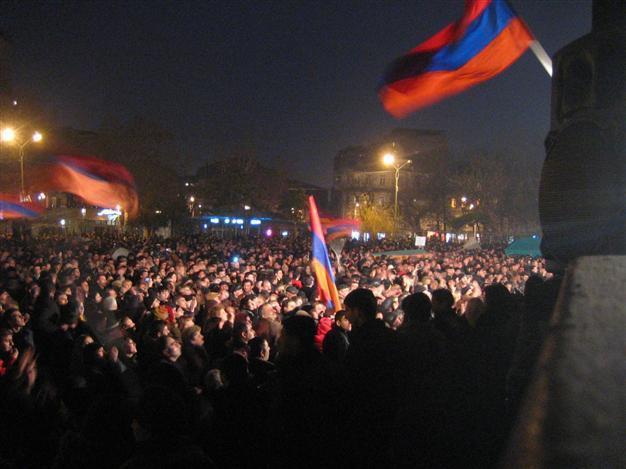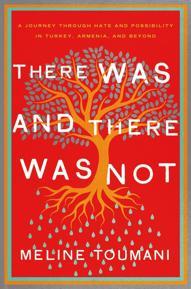Turkey, Armenia and beyond
William Armstrong - william.armstrong@hdn.com.tr
 ‘There Was and There Was Not: A Journey Through Hate and Possibility in Turkey, Armenia and Beyond’ by Meline Toumani (Metropolitan Books, 286 pages, $28)
‘There Was and There Was Not: A Journey Through Hate and Possibility in Turkey, Armenia and Beyond’ by Meline Toumani (Metropolitan Books, 286 pages, $28) In 2003-04, the late Turkish Armenian journalist Hrant Dink wrote a series of articles on the psychology of the Armenian diaspora. The series, titled “On Armenian Identity,” caused a stir by suggesting that diaspora Armenians were blinded by such hatred that it had become like “poison in their blood.” Rather than waiting for Turkey to change, Dink argued, they should rid themselves of feelings of hate toward Turks, put aside counterproductive genocide recognition campaigns, and focus their efforts on helping the country of Armenia.
In 2003-04, the late Turkish Armenian journalist Hrant Dink wrote a series of articles on the psychology of the Armenian diaspora. The series, titled “On Armenian Identity,” caused a stir by suggesting that diaspora Armenians were blinded by such hatred that it had become like “poison in their blood.” Rather than waiting for Turkey to change, Dink argued, they should rid themselves of feelings of hate toward Turks, put aside counterproductive genocide recognition campaigns, and focus their efforts on helping the country of Armenia. In a willful misunderstanding of what he had actually written, he was later prosecuted under the Turkish Penal Code’s notorious Article 301 for “insulting the Turkish identity.” Though Dink was later acquitted, Ogün Samast, the teenage triggerman who shot him dead in January 2007, would later cite these “insults” as motivation for the killing.
Despite his courage, Dink was viewed with suspicion by Armenians in the diaspora, some of whom disparage the Istanbul Armenians as afflicted with a kind of Stockholm syndrome that weakens their necessary hatred for Turks. Many diaspora Armenians saw Dink’s call for debate beyond the cul-de-sac of genocide recognition as an unforgivable betrayal.
A similar reaction has greeted “There Was and There Was Not” by U.S. journalist Meline Toumani, which turns a highly unflattering light on American Armenians. Responses have ranged from criticism of exaggeration, to clichés about her being a “self-hating Armenian,” to angry calls for a boycott. It is not hard to see where the anger comes from. Toumani’s book paints a portrait of a diaspora community full of single-issue zealots, where there are few safe shelters from “politics, lobbying, hatred, nationalism, protests.” As the diaspora evolved and assimilated in countries across the world, she writes, “there was only one thing that everybody agreed on: the Turks hated us and we hated the Turks. This trumped everything … From as early as I knew anything, I had known Turkey only as an idea: a terrifying idea, a place filled with people I should despise.” On reflection, her childhood experiences at summer camp - where children were encouraged to celebrate the ASALA terrorist group, which killed dozens of Turkish diplomats and members of their family through the 1970s and 80s - were deeply troubling.
Though uncompromising in referring to events in 1915 as genocide, Toumani wondered whether such single-mindedness about genocide recognition was “worth its emotional and psychological price.” Slightly melodramatically, she writes that “our obsession with 1915 was destroying us,” and looks instead for a “way to honor a history without being suffocated by it.”
The resulting book explores this question, describing the author’s experiences in the U.S., Turkey and Armenia itself. She decided to move to Istanbul and travel around Turkey for two years because she “could no longer live with the idea that I was supposed to hate, fear, and fight against an entire nation and people.” In Turkey, she mixed in diverse circles, and at one point even arranged a meeting with Yusuf Halacoğlu, the “denialist-in-chief” who was head of the Turkish Historical Society (TTK) at the time and is now an MP for the Nationalist Movement Party (MHP). Toumani has the courage to admit that she floundered in their meeting, reflecting that “certainty is always more powerful than doubt.”
She started out intending to research and write about Armenian-Turkish relations, “with the idea that some kind of ‘soft reconciliation’ was important and valuable,” but ultimately her project is a bit of a failure. Though gaining sympathy for the Turkish predicament, she finds that in Turkey not only are people more intolerant than she had expected, but her own prejudices had not gone away either: “Although I had started out looking for a way around the Armenian diaspora’s fixation on genocide recognition, I was starting to realize that in my interactions with Turks, if we didn’t already agree on what had happened in 1915, the barrier between us was too great.”
Still, to quote Michel de Montaigne, there are some defeats more triumphant than victories. Toumani manages to say plenty of illuminating things throughout her book, which sometimes resembles an Armenian counterpart to Turkish journalist Ece Temelkuran’s 2008 title “Deep Mountain.” In that book, Temelkuran tried to chart a delicate course in the fraught territory between the nationalism of both sides, reaching out to Armenians in Armenia and in the diaspora. As a former reporter for the New York Times, Toumani is a more fluid writer than Temelkuran and also a less annoying persona. Perhaps surprisingly given the subject matter, “There Was and There Was Not” ends up being quite a page-turner.
Of course, plenty will scorn Toumani’s search for “soft reconciliation” as naïve, when Turkish officials continue to issue uncompromising calls on the Armenian diaspora and disingenuously exhort everyone to “leave history to the historians.” But on the 100th anniversary of 1915, people on all sides could do worse than read this brave book.










